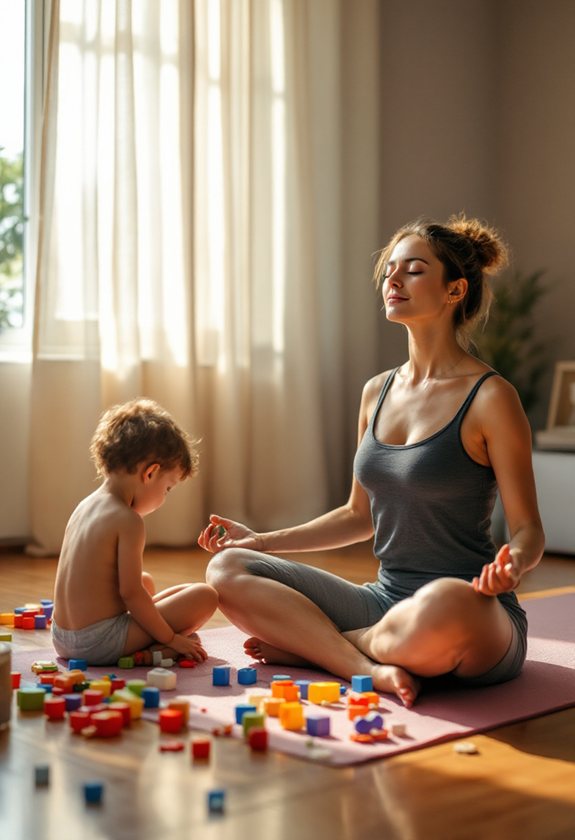When you practice mindful parenting, you're better equipped to handle tough times because you've developed stronger emotional awareness and regulation skills. Through techniques like focused breathing and present-moment awareness, you can respond to challenges more calmly instead of reacting impulsively. This improved self-control creates a more positive environment for your children, strengthens your parent-child bond, and helps you make better parenting decisions. Understanding these mindfulness principles opens the door to transforming your entire family dynamic.
Key Takeaways
- Mindful parents have enhanced emotional regulation abilities, allowing them to respond thoughtfully rather than react impulsively to challenging situations.
- Regular mindfulness practice builds neural pathways that support better decision-making during stressful parenting moments.
- Mindful awareness helps parents recognize stress cycles early and implement calming techniques before situations escalate.
- Through mindful communication, parents maintain stronger connections with their children during difficult times.
- Self-reflection and breathing exercises give parents practical tools to stay calm and present during family conflicts.
The Science Behind Mindful Parenting
Have you ever wondered what makes mindful parenting so effective in the modern hectic world? The science reveals that mindful awareness actually changes how your brain responds to parenting challenges, helping you stay calm when stress hits.
Research shows that practicing mindful parenting strengthens your emotional regulation abilities.
When you're more mindful as a parent, your brain becomes better at processing difficult situations. You'll notice improved control over your reactions, leading to more consistent parenting choices.
Through mindfulness practices like breathing exercises and guided meditations, you're building neural pathways that support better decision-making and emotional awareness in your parenting experience.
Breaking Free From Parental Stress Cycles
While parenting brings immense joy, the daily pressures can trap you in cycles of stress that affect both you and your children. Through stress awareness, you'll begin to recognize when you're entering a sympathetic response state and can take action before it escalates.
Breaking these cycles starts with emotional regulation – practicing mindful breathing, stepping away when overwhelmed, and engaging in physical activity to release tension.
You're not alone in this process. Build a support network, prioritize self-care activities, and keep in mind that managing your stress creates a safer, more stable environment for your children to thrive.
Mindfulness Techniques for Daily Parent-Child Moments
Mindfulness techniques transform everyday parent-child interactions into meaningful moments of connection and growth. You'll find that creating mindful moments throughout your day helps you stay present and responsive rather than reactive.
Start by practicing focused breathing during daily routines like meal prep or bedtime stories.
Your parenting presence deepens when you fully engage in activities with your child.
Try the five senses exercise together – notice what you see, hear, smell, feel, and taste in the present moment. This simple practice helps both you and your child stay grounded while strengthening your bond through shared awareness.
How Mindfulness Shapes Better Family Relationships
As you begin to practice mindful awareness within your family, you'll uncover how it transforms the quality of your relationships in profound ways.
Through mindful communication and empathetic listening, you're building stronger connections that last.
Here's how mindfulness improves your family bonds:
- You'll become more responsive to your children's needs, helping them feel secure and understood.
- Your improved self-reflection leads to calmer reactions during challenging moments.
- You'll notice increased emotional awareness, making conflicts easier to navigate.
- Your children will feel more comfortable sharing their thoughts, knowing you're truly present.
These positive changes create a more harmonious home environment where everyone feels heard and valued.
Creating Calm in Parenting Chaos
Beneath the daily whirlwind of parenting challenges lies your ability to create moments of genuine peace and connection.
By practicing mindful moments throughout your day, you'll find yourself better equipped to handle tantrums, meltdowns, and everyday stressors with a calmer presence.
Your parenting presence matters more than you might think.
When you take deep breaths during challenging situations and respond rather than react, you're teaching your children valuable emotional regulation skills.
Simple practices like pausing before responding, maintaining moment-to-moment awareness, and showing yourself compassion can transform chaos into opportunities for connection and growth.
Building Resilient Children Through Mindful Parents
When parents adopt mindful practices, they're building a foundation of resilience that will serve their children throughout life.
Your mindful approach creates a ripple effect, teaching valuable emotional regulation skills through example and consistent support.
Here's how your mindfulness directly builds your child's resilience strategies:
- You'll model stress management through calm responses
- You're creating a secure environment that enhances learning
- Your child develops stronger emotional intelligence
- You'll foster better decision-making abilities
Transforming Challenging Behaviors With Present Awareness
Building your child's resilience creates an ideal foundation for the next step: mastering present-moment awareness during challenging behaviors.
When your child acts out, you'll find that emotional awareness helps you stay calm and choose mindful responses instead of reacting impulsively. Notice your breathing, pause before responding, and observe the situation without judgment. This practice transforms difficult moments into opportunities for connection.
You'll realize that present awareness helps you communicate more effectively with your child, reducing both their challenging behaviors and your stress levels.
The Ripple Effect: When Parents Practice Mindfulness
Through the practice of mindful parenting, you'll uncover that your own mindfulness expedition creates powerful ripple effects throughout your family.
Mindful parenting isn't just about you – it's a transformative journey that naturally flows through and enriches your entire family dynamic.
When you develop mindful awareness, you'll experience transformative changes that benefit everyone under your roof.
Here's what happens when you adopt stress reduction through mindfulness:
- Your anxiety levels decrease, creating a calmer home atmosphere
- You'll respond thoughtfully instead of reacting emotionally
- Your parent-child bonds strengthen through quality connections
- Your children learn emotional regulation by watching you
These positive changes ripple outward, touching every aspect of family life and helping you navigate parenting challenges with greater ease and confidence.
Practical Tools for Staying Centered as a Parent
As you navigate the daily challenges of parenting, having practical mindfulness tools at your disposal can make all the difference in staying centered and calm.
Start by incorporating mindful routines into your day, like taking three deep breaths before responding to your child's behavior or using a mindfulness bell during changes.
Building emotional awareness through simple practices can transform your parenting experience.
Try keeping a mindfulness box filled with calming items like stress balls or guided meditation cards. When you're feeling overwhelmed, pause to do a quick body scan, noticing where you hold tension, and consciously release it while practicing self-compassion.
Making Mindfulness Work in Real Family Life
Making mindfulness work in your real family life doesn't require hours of meditation or complex routines.
You can weave simple practices into your daily activities that create lasting positive change for everyone.
- Start with mindful meals by having everyone share one highlight from their day.
- Create bedtime gratitude rituals where family members express appreciation.
- Take three deep breaths together before leaving for school or work.
- Practice "pause and respond" instead of reacting during stressful moments.
Frequently Asked Questions
How Does Mindful Parenting Affect Children With Specific Learning Disabilities?
Your mindful communication helps your child with learning disabilities develop emotional resilience, leading to reduced anxiety, better behavioral control, and improved self-regulation skills through your heightened awareness and supportive interactions.
Can Mindfulness Techniques Help Parents Cope With Their Own Childhood Trauma?
You can effectively manage your childhood trauma through mindfulness practices, which support trauma healing and emotional regulation. They'll help you process difficult memories while staying grounded in the present moment.
What Role Does Mindful Parenting Play in Single-Parent Households?
You'll find mindful parenting especially valuable in single-parent homes, where it strengthens emotional regulation and mindful communication. It helps you manage stress better and build stronger connections with your children.
How Do Cultural Differences Influence the Effectiveness of Mindful Parenting Practices?
Your cultural perceptions shape how you'll implement mindful parenting. Different parenting styles across cultures affect your approach, but you can adapt mindfulness practices to align with your family's cultural values.
Does Mindful Parenting Impact Academic Performance and Educational Outcomes in Children?
Your mindful parenting improves your child's academic achievement through better emotional regulation skills, helping them stay focused, manage stress, and excel in their studies while building a supportive learning environment.
Conclusion
You've taken significant steps toward becoming a more mindful parent by learning these techniques and strategies. When you stay present, breathe through challenges, and respond with awareness, you're creating lasting positive changes for your family. Remember, mindful parenting isn't about perfection – it's about growing alongside your children. Start small, be patient with yourself, and watch how these practices transform your parenting experience.







